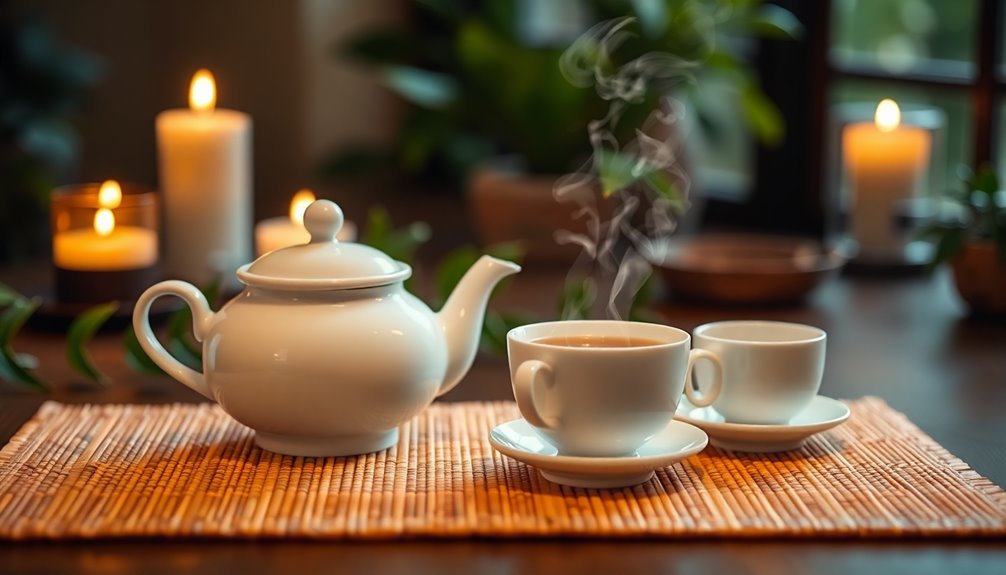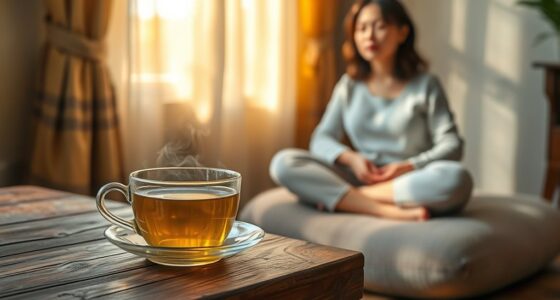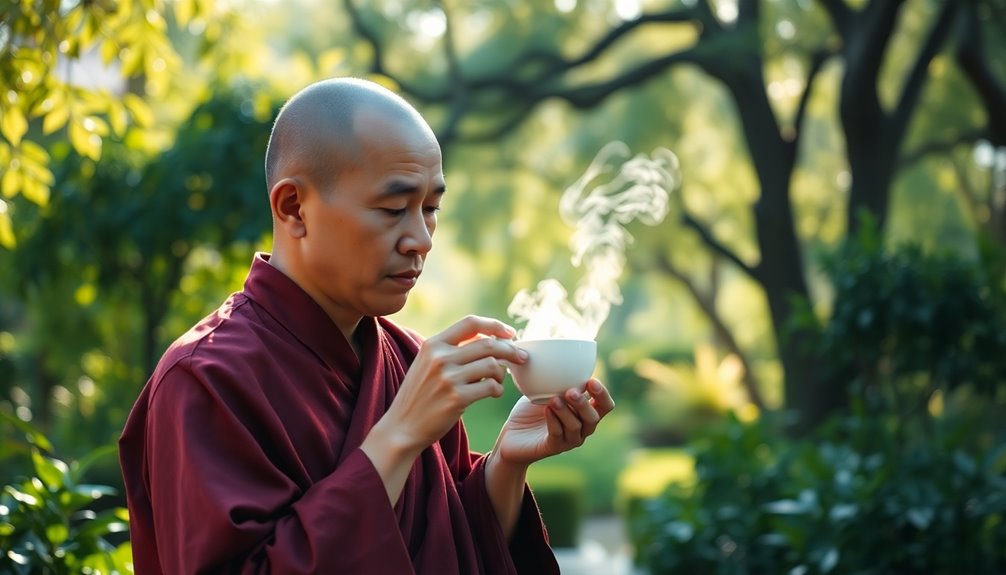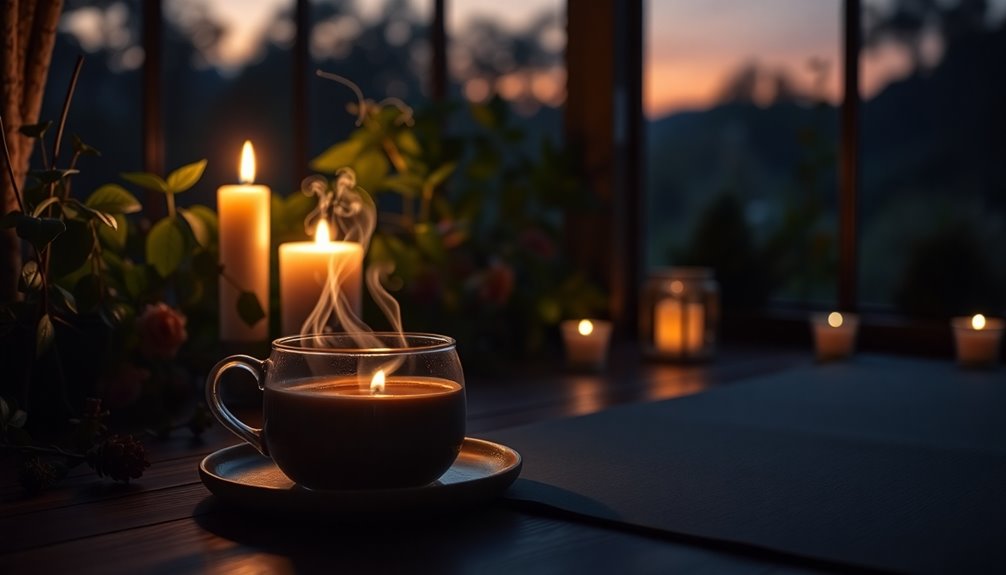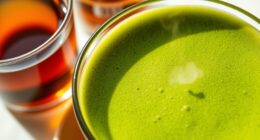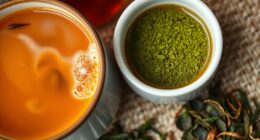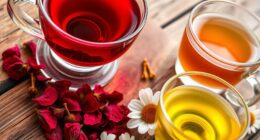To create a zen-like atmosphere with tea, start by choosing calming herbal options like chamomile or lavender. Find a quiet, clutter-free space and prepare your tea mindfully. Boil water at the right temperature for your tea type and pour it slowly. As it steeps, inhale the soothing aromas and watch the leaves unfurl. Embrace the ritual by sipping slowly, appreciating the flavors, and letting each sip ground you in the moment. Incorporate tea breaks into your day to recharge and calm your mind. Keep enjoying the process, and you'll discover even more ways to create serenity around you.
Key Takeaways
- Choose calming herbal teas like chamomile or lavender to promote relaxation and create a serene atmosphere.
- Engage in tea meditation by focusing on the preparation ritual in a quiet space.
- Use soft lighting and a clutter-free environment to enhance the tea experience.
- Incorporate mindful breathing and sensory engagement during brewing and sipping to ground yourself in the moment.
- Designate specific tea breaks throughout the day to disconnect and recharge mentally.
Introduction
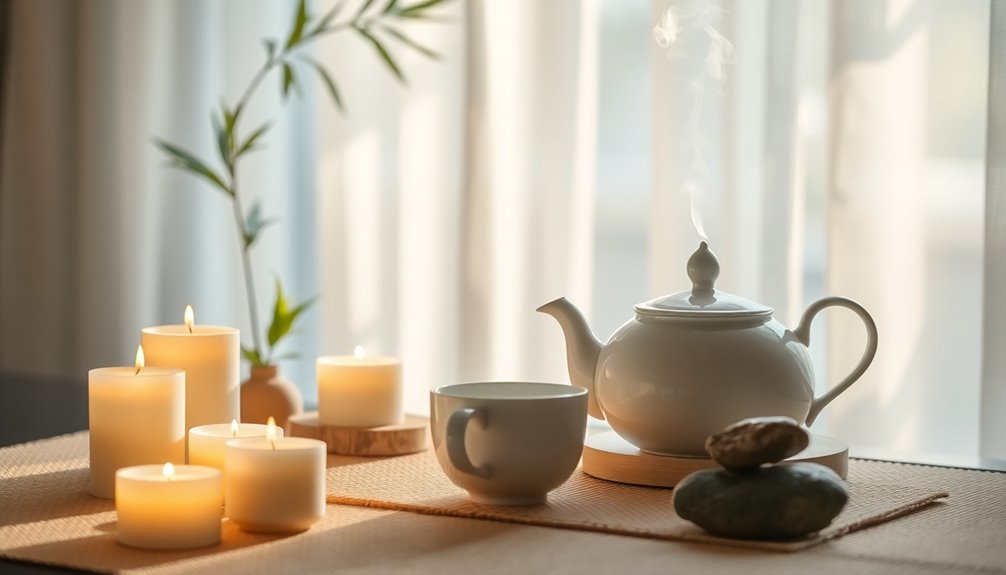
In today's fast-paced world, creating a Zen-like atmosphere can feel challenging, but incorporating tea into your routine offers a simple solution.
Start by selecting calming herbal teas, like chamomile or lavender. These are known for their soothing properties and are perfect for winding down. Herbal teas like chamomile may also promote relaxation and improve sleep quality. Additionally, consider trying oolong tea for its unique flavor and calming effects, as it combines floral and fruity notes. Aromatherapy can stimulate the limbic system, which enhances emotional well-being and complements the calming effects of tea.
As you prepare your tea, focus on the ritual itself. This process can become a form of tea meditation, where you engage fully with the experience.
Take deep breaths, inhaling the aromatic scents of the herbs, and notice the warm steam rising from the cup.
Finding a quiet and clutter-free space enhances your tea experience. Make sure your environment is peaceful, allowing your mind to reflect and relax.
As you pour the hot water over the tea leaves, move slowly and intentionally. This helps foster an atmosphere of serenity and mindfulness. Using glass or ceramic vessels for brewing can also enhance the flavor and overall experience of your tea.
Engage with the colors and warmth of the tea, letting each sip transport you to a tranquil state. Additionally, consider incorporating flower teas, as they are known for calming effects and can further enhance your relaxation experience.
Tea's Calming Properties Explained
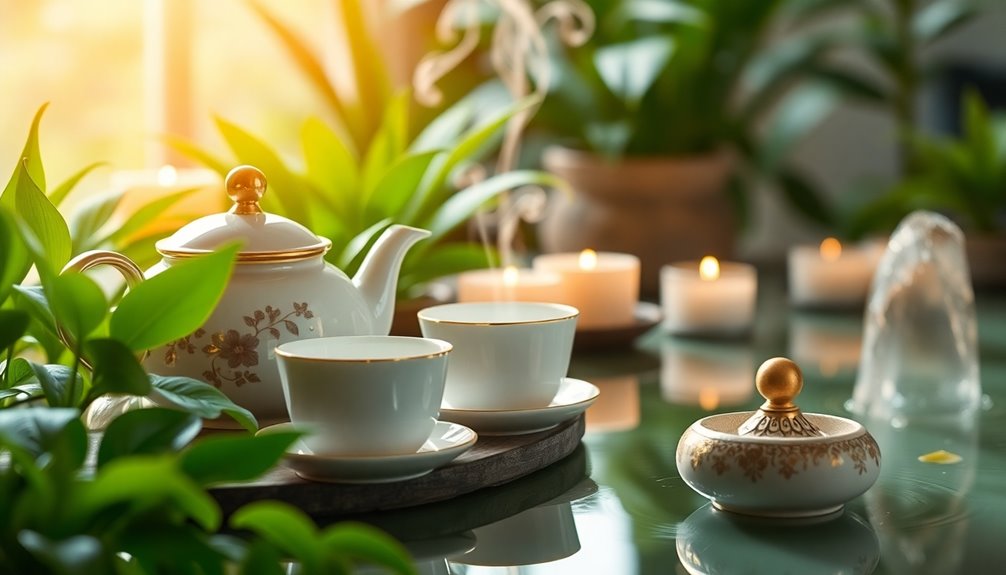
While you may be familiar with the soothing effects of tea, its calming properties run deeper than just a warm cup in your hands. Tea contains L-theanine, an amino acid that boosts relaxation and reduces stress. This compound increases alpha brain wave activity, helping create a calm atmosphere.
When you sip a good cup of tea, especially herbal kinds like chamomile or lavender, you can lower anxiety and improve sleep quality, adding to your peaceful environment. The preparation of tea can also draw from the principles of traditional tea ceremony, which emphasizes mindfulness and harmony. The caffeine content in herbal teas is generally low, making them ideal for evening enjoyment without disrupting sleep.
The act of brewing tea itself encourages you to focus on mindfulness. As you prepare your tea and let it steep, take a moment to enjoy the aroma and the warmth of the cup. This ritual can be a form of mindfulness meditation, making it easier to reflect and express gratitude.
Sipping tea slowly allows you to savor each moment, enhancing feelings of tranquility. Certain teas, like green tea, are packed with antioxidants that support mental well-being, fostering a peaceful mindset. Additionally, the global tea market, valued at approximately $200 billion, reflects the increasing consumer demand for sustainable products that contribute to a more mindful lifestyle. The variety of tea types, such as herbal tea and green tea, offers different calming effects that can further enhance your atmosphere.
Brewing Temperature Affects Flavor
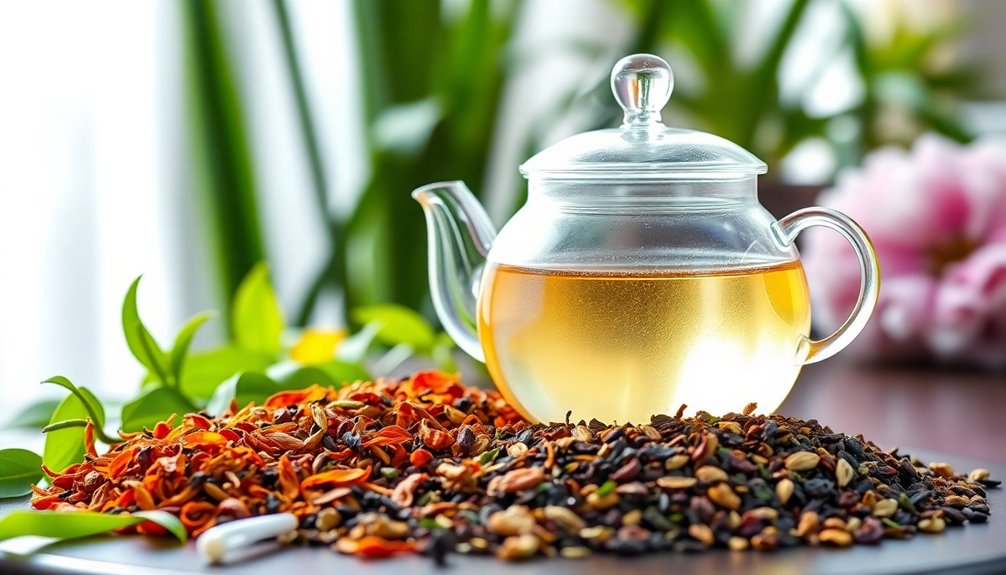
Getting the brewing temperature right is crucial for unlocking the full flavor potential of your tea. Each type of tea has its ideal brewing temperature. For example, green tea is best at 160-180°F (71-82°C), oolong tea at 190-200°F (88-93°C), and black tea at 200-212°F (93-100°C).
When you use the right brewing temperature, you help release essential oils and aromatic compounds, which enhances the overall taste and aroma of your tea.
If the water is too hot, especially for delicate teas like green or white, you might end up with a bitter taste. On the other hand, cooler temperatures can lead to a weak flavor.
It's also important to adjust the steeping time based on the brewing temperature. Lower temperatures often require longer steeping times to bring out the full flavor.
To ensure you're brewing at the right temperature, consider using a thermometer. This simple tool can make a big difference in the quality and enjoyment of your tea.
Tea's Role in Sensory Immersion
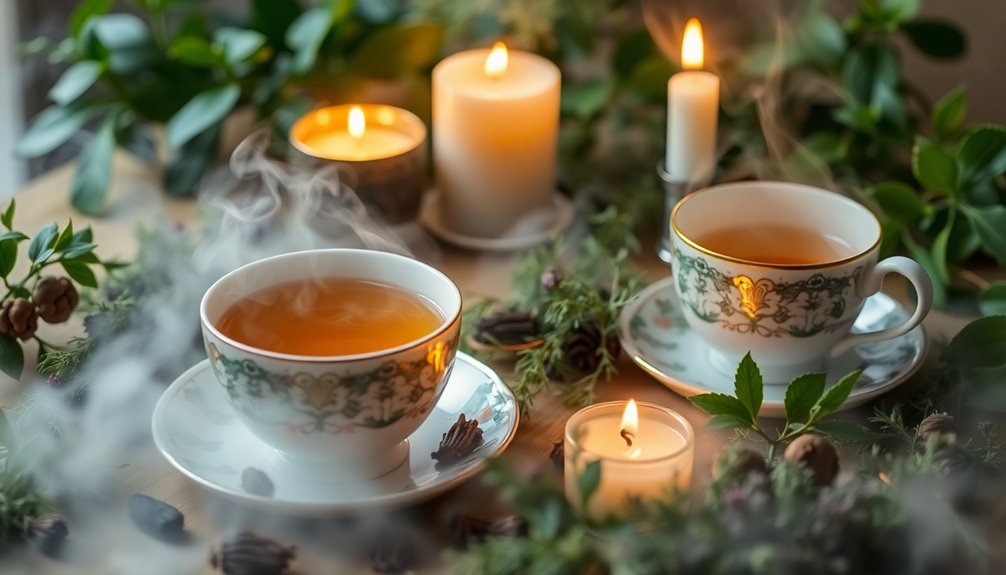
Brewing tea isn't just about temperature; it's also a rich sensory experience that can elevate your sense of tranquility. When you steep your tea, take a moment to inhale its aroma; it can create a calming atmosphere that promotes relaxation and mindfulness. The fragrant notes of herbal teas, such as chamomile, can further enhance this soothing experience. Additionally, incorporating unique planters into your space can complement the tranquil environment by introducing greenery that soothes the eyes. Drinking tea can also provide health benefits such as relaxation and improved focus. Engaging in this mindful practice can be akin to the effects of music therapy which enhances emotional well-being.
As the hot water interacts with the leaves, you'll notice a delightful transformation in color. This visual change engages your senses, adding to the peaceful vibe.
You'll also feel the warmth of the cup in your hands, which enhances your comfort and tranquility.
Listen closely as the hot water boils and the tea gently pours into your cup. These sounds foster auditory awareness, helping you focus on the present moment. Additionally, the choice of tea kettle material can enhance this experience by affecting heat retention, which is essential for brewing the perfect cup.
Caffeine Sensitivity in Tea Drinkers
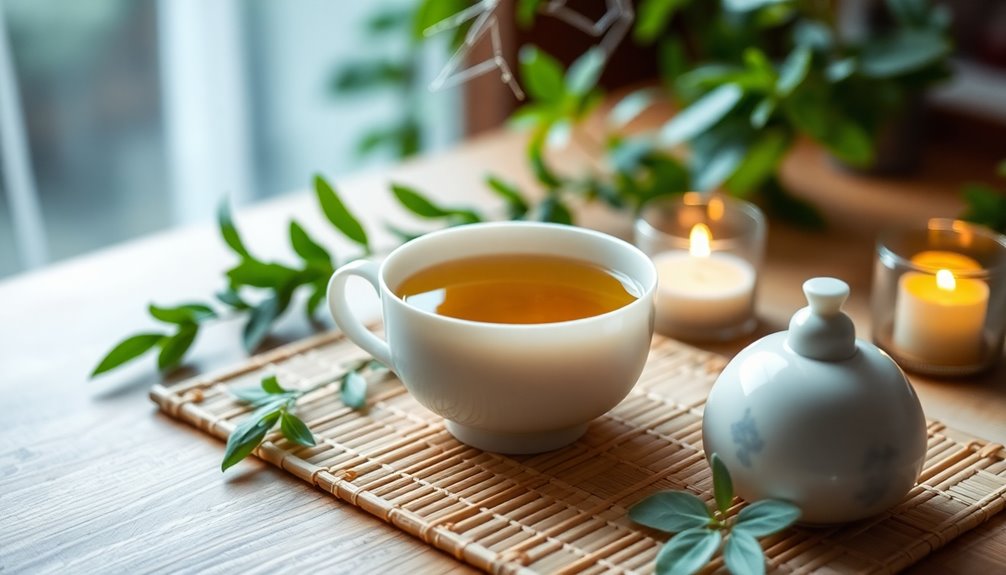
Caffeine sensitivity affects many tea drinkers, leading to varied experiences with this beloved beverage. Some folks feel jittery or anxious after just a sip, while others can enjoy multiple cups without a hitch. If you're one of those sensitive drinkers, it's essential to choose your tea wisely.
Green tea usually has about 20-45 mg of caffeine per 8-ounce cup, while black tea can have 40-70 mg. So, if you're sensitive, you might want to skip those and reach for a tea bag of herbal teas instead. Options like chamomile or peppermint are naturally caffeine-free and perfect for a calming evening.
Caffeine sensitivity can cause symptoms like increased heart rate or sleep disturbances, making it tricky to maintain a peaceful meditation practice. Additionally, maintaining a balanced diet and regular exercise can further support your overall well-being while navigating caffeine sensitivity.
To keep your relaxation routine stress-free, consider enjoying herbal teas in the evening. They won't disrupt your sleep patterns, helping you drift off easily.
Practical Applications
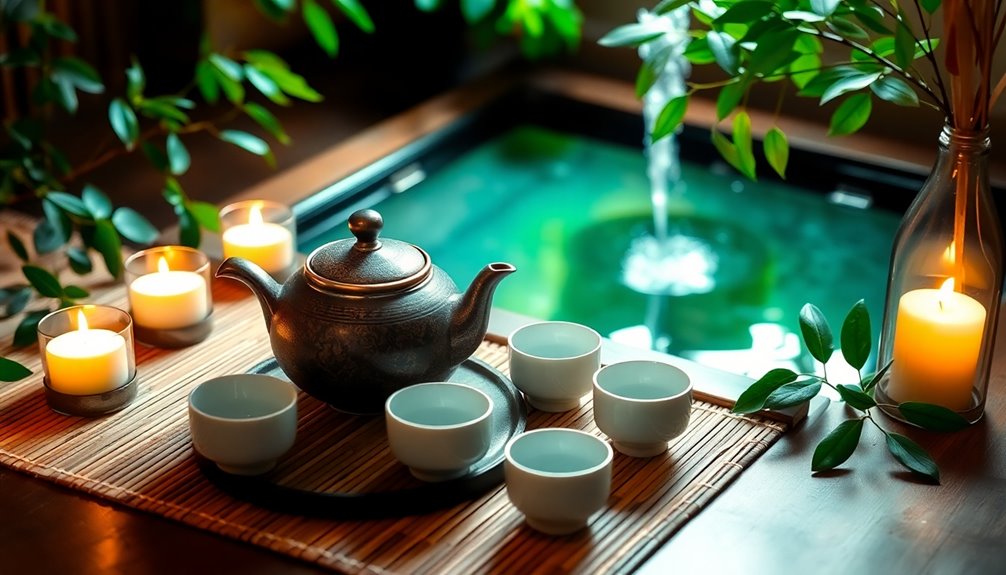
Finding the right tea can enhance your meditation and relaxation practices, especially if you're sensitive to caffeine. To create that Zen-like atmosphere, set aside some time every day for a calming tea session. First, find a quiet space with minimal distractions. This will help you focus and unwind.
Next, choose calming herbal teas like chamomile or lavender, known for their soothing properties. As you prepare your tea, pay attention to each step—boil the water, steep the leaves, and breathe in the delightful aromas. This mindfulness practice deepens your sense of presence and makes the experience more enjoyable.
While sipping, create a sensory experience. Notice the colors and flavors of the tea; let each sip ground you in the moment. You can also use tea breaks as intentional pauses throughout your day. These pauses encourage mindfulness and tranquility, helping you recharge.
Incorporating these small moments into your routine won't only enhance your relaxation but also promote a peaceful mindset. So, embrace the ritual and let tea be your companion on your journey to inner calm.
Frequently Asked Questions
What Is the Way of Tea and Zen?
The Way of Tea, or Chado, connects you to Zen by emphasizing mindfulness and simplicity. You engage deeply with each movement, allowing the brewing and drinking process to become a meditative experience that fosters tranquility.
What Tea Do Zen Buddhists Drink?
Zen Buddhists drink matcha for its calming properties, sencha for its delicate flavor, and oolong for its aromatic complexity. Herbal teas like chamomile and peppermint are also enjoyed to enhance relaxation during meditation.
How to Make Tea a Ritual?
To make tea a ritual, choose a specific time daily, use your favorite mug, and focus on the sensory experiences. Allow each movement to become intentional, savoring every moment for mindfulness and tranquility.
What Is Meditative Tea?
Meditative tea is a mindful practice where you engage fully in brewing and savoring tea. You focus on each step, appreciating aromas and flavors, fostering relaxation, gratitude, and a deeper connection to your surroundings.
Conclusion
Creating a zen-like atmosphere with tea is easy and fun! By choosing the right tea, paying attention to brewing temperatures, and enjoying the calming experience, you can transform your space into a peaceful retreat. Remember to consider your caffeine sensitivity, too! So, gather your favorite tea, find a cozy spot, and take a moment to breathe and relax. With these tips, you'll be well on your way to enjoying a serene tea time that refreshes your mind and spirit!

